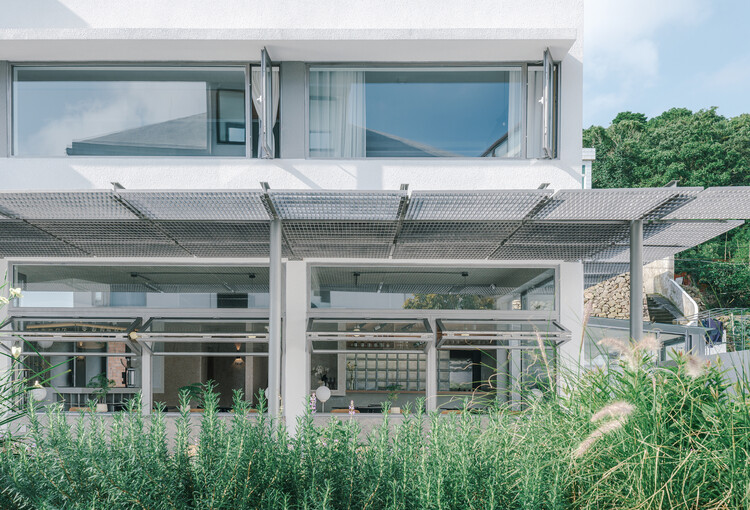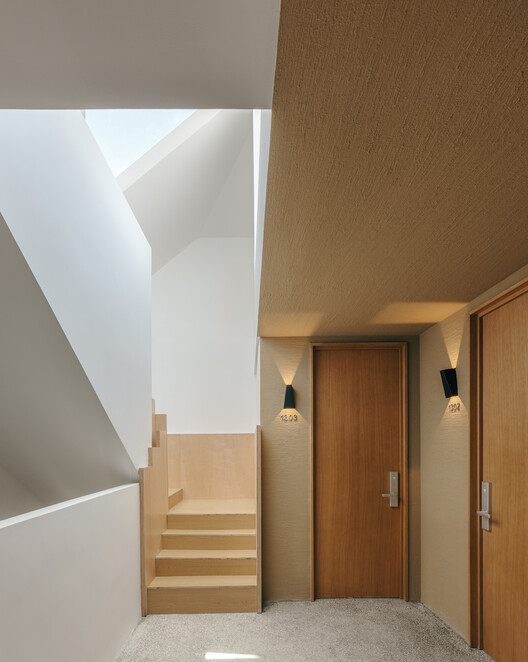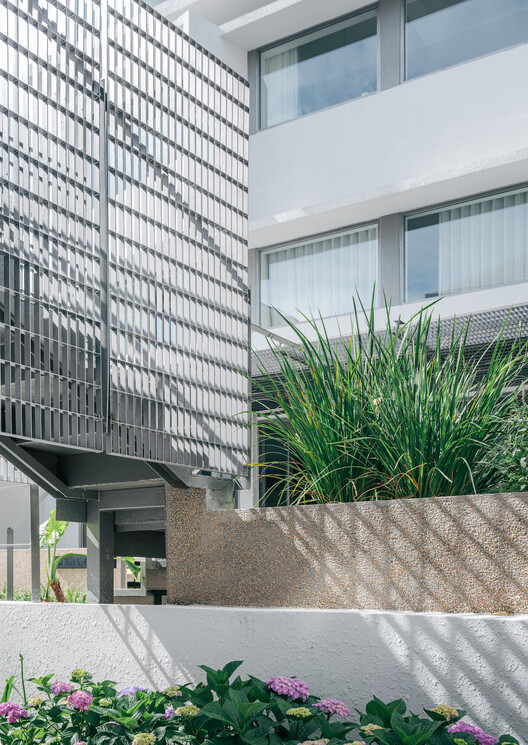
-
Architects: MAT Office
- Area: 720 m²
- Year: 2024
-
Photographs:ZHU Yumeng, Kangshuo TANG

Text description provided by the architects. The Zhoushan Summer Hotel was completed five years ago. The strategy of adding balconies and changing the facades at that time changed the limitations of the original square-shaped houses in the area and brought a new sense of interior and exterior. As the Summer Hotel became more famous, this design strategy gradually evolved into a facade style in the following years. Almost all the newly built houses in the village had same white walls with square windows. The goal of reversing the villagers' desire to build "European-style villas" through a simple facade effect was quickly achieved.

However, the success of an attempt can also bring unexpected results: the village continues to build houses, and every household hopes to get a share of the tourism market. In a few years, the number of B&Bs in this small bay has increased by three times. With the large number of rough self-built houses emerges, the small fishing village has begun to become another kind of chaos. The contradictions brought about by this uncontrolled development will be manifested in a few years: more and more houses but still lack of high-quality spaces; the degradation of village environment will also reduce the advantages of the beach's natural resources; people will rush to the next destination, and the development here may become unsustainable.



Design Strategy
At this time, The Summer Hotel also had the opportunity to expand. It is a pair of square three-story houses adjacent to each other not far away. The building is not very noticeable among the dozens of newly built houses on the beach. The main structure of the hillside house has just been poured, and the facade of the seaside house has been completed; there is a 1.5-meter height difference between the two buildings. The renovation requires that there should be no expansion or change in the shape of the original house.

We separated the courtyards of the seaside building and the hillside building. The terrace facing the sea is completely open to the beach and has an open leisure scene with tea and beverage facilities. The courtyard of the hillside building in the middle is used as the inner courtyard of the hotel, and is combined with the reception and dining room. The design established a passage from the seaside to the middle courtyard by treating the step landscape, connecting the entrance and the lobby. At the same time, an floating bridge directly connects the second floor of the seaside building from the middle courtyard. The original steps of the seaside building were converted into a swimming pool facing the sea.


After comprehensively considering the room's sea view experience and cost control, the seaside building made simple facade adjustments while retaining the original square windows; while the hillside building adopted horizontal long windows like Stein's house as the facade language. The strong horizontal lines brought by the long windows and the full-length sunshades above make the building stand out from the surrounding homogeneous houses, resisting the chaos brought by the wanton development around it.

Materialization
The "materialization" of this project defines a more restrained and humanized usage scenario, which is mainly due to the cement-like textured walls and floors that were once widely used in Jiangsu and Zhejiang regions, as well as the subtle changes brought by the aggregates of various shapes and colors. This traditional material is mixed with light multi-layer boards and metal plates, giving a contemporary expression to the temperament of the fishing village.

1.Terrazzo + Washed Stone
This was a common building floor and wall material in the south in the 1980s and 1990s. We tried to use the effects of two types of washed stone and four types of terrazzo in the public areas, corridors and guest rooms. The dining and tea shop used black stone formed by scouring black sedimentary rocks as aggregate, combined with white and gray cement.


2.Plaster and cement
Plaster and cement walls were once a simple and common finishing method in rural areas. We used cement-scraped walls and ceilings in public reception areas such as restaurants and tea shops; brown plaster was used in the corridors and guest rooms to echo the colors of the reefs and beaches on the seaside.


3.Multi-layer plywood
The warm-colored multi-layer plywood is widely used in the interior space: stair railings, bench seats, public areas and guest rooms, etc., thus forming an embedded fixed furniture system. The wood texture of the multi-layer plywood contrasts with the cement texture, bringing a warmer and more comfortable effect to the human scale.



4.Metal material - steel grille + aluminum plate
The design inspiration of the metal material comes from the steel structure sunshade that can be seen everywhere in the village. The steel grille is used in the canopy extending to the middle yard, and the sky bridge connecting the yard to the second floor of the seaside building. The silver-gray metal material can bring a sense of youthful vitality to the white building facade.

South Wind Blow
The most difficult issue to resolve in such a rural environment with natural scenery is the expectations of tourists and locals regarding the development of natural resources and the preservation of local culture. On the one hand, people want to experience an authentic fishing village; on the other hand, they also hope to find the familiar habits and conveniences of urban life everywhere.

After the fishing village buildings have been almost completely replaced by three-bay white houses, facing the new design proposition, we hope to provide a slightly "refined" homestay experience through space organization and material shaping, starting from small things, to fit people's imagination of the new island life. At the same time, by the realization of this project, we hope to explore a slow and relaxing leisure method based on the long-term development of the bay of Zhangzhou Village.



If the previous Summer Hotel created a homestay atmosphere, the second phase "Southern Wind" adds a sense of relaxation and pleasure, by climbing up the steps from the seaside and feel the chill of the summer. Watching people come and go in the yard; children swinging in front of the sea-view terrace; young men and women on the beach at night... Everything seems to be in a Hirokazu Koreeda movie, just a fragment of a peaceful life, warm and delicate, but there is a constant force that drives us to keep forward.



























































